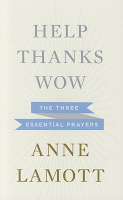Help, Thanks, Wow
In this Thanksgiving week, I revisited it and indeed there
was more waiting for me, when I dug into the book for a second time. Lamott’s great gift
is her constant swerve to avoid conventional religious language and in doing so,
she makes things appear fresh. She writes:
You may in fact be wondering what I even mean when I use the word “prayer”… Let’s not get bogged down on whom or what we pray to. Let’s say prayer is communication from our hearts to the great mystery, or Goodness; to the animating energy of love we are sometimes bold enough to believe in, to something unimaginably big, and not us; we could call this force Not Me, and Not Preachers Onstage with a Choir of 800. Or for convenience we could just say “God.”
In the section on gratitude, she begins in the capital-T Thanksgiving
convention of cataloguing things that you could potentially be grateful for.
Gratitude runs the gamut from shaking your head and saying, “Thanks, wow, I appreciate it so much,” for your continued health, or a good day at work, or the first blooms of the daisies in the public park, to saying, “Thanks, that’s a relief,” when it’s not the transmission, or an abscess, or an audit notice from the IRS. “Thanks” can be the recognition that that you have been blessed mildly, or with a feeling as intense as despair at the miracle of having been spared. You say Thankyouthankyouthankyouthankyou. My wife is going to live. We get stay in this house. They found my son: he’s in jail, but he’s alive; we know where he is and he’s safe for the night.
Things could have gone either way, but they came down on our side. It could have been much, much worse, and it wasn’t. Heads, we won.
The point Lamott is making here is well-taken, if perhaps a
little banal. What astonishes me, after looking at the passage multiple times, is the
way she shapes the rhythm of the sentences to increase and decrease the reader’s
heartbeat, giving us finely controlled microdoses of adrenaline that emulate
the feelings she is describing.
She goes on to share more of her own hard-won wisdom:
Domestic pain can be searing, and it is usually what does us in. It’s almost indigestible: death, divorce, old age, drugs; brain-damaged children, violence, senility, unfaithfulness. Good luck figuring it out. It unfolds, and you experience it, and it so horrible and endless that could almost give up a dozen times. But grace can be the experience of a second wind, when even though what is clarity and resolution, what you get is stamina and poignancy and the strength to hang on.
Again, is the actual point that Lamott is making here what matters? Yes, of course it matters, but the brutal examples she picks are emblematic and arbitrary. What impresses me most it’s the deliberate awkwardness of the sentences. The sentences have no identifiable shape, and are as arbitrary as the pain and suffering she describes. The bluntness of “Good luck figuring it out”; the leisureliness of “grace can be the experience of a second wind”; the excessive number of “ands” in the phrase “stamina and poignancy and the strength to hang on” – they are all masterful touches. This is writing designed to be effective rather than beautiful and pleasing.
Finally, Lamott – without using the obvious word choices of “wisdom” or “experience” or “suffering” – she writes about the how time puts things in perspective in a way that gets beyond the sometimes hollow clichés of Thanksgiving.
Most of us figure out by a certain age – some us later than others – that life unspools in cycles, some lovely, some painful, but in no predictable order. So you have could lovely, painful, and painful again, which I think we all agree is not at all fair. You don’t have to like it, and you are always welcome to file a brief with the Complaints Departments. But if you’ve been around for a while, you know that much of the time, if you are patient and paying attention, you will see that God will restore what the locusts have taken away.
I am grateful for the work of Annie Lamott.





Comments
Post a Comment